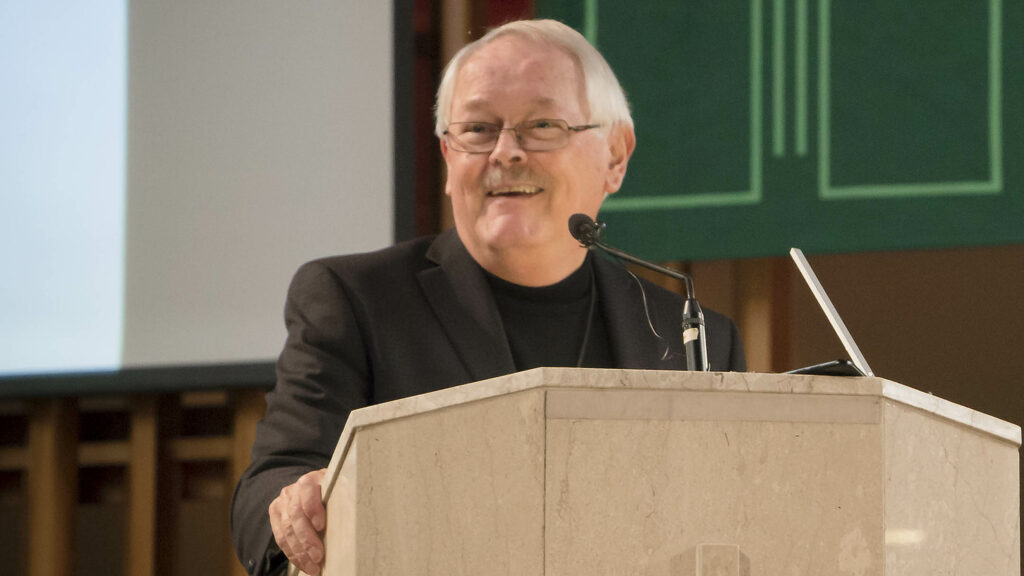Nothing so much approximates the language of God as does silence. Meister Eckhart said that.
Among other things, he is affirming that there is some deep inner work that can only be done in silence, alone, in private.
He’s right of course, but there’s another side to this. While there is some deep inner work that can only be done in silence, there is also some deep, critical, soul work that can only be done with others, in relationship, in family, in church, and in society. Silence can be a privileged avenue to depth of soul. It can also be dangerous. Ted Kaczynski, the Unabomber, lived in silence, alone, as have many other deeply disturbed individuals. Mental health professionals tell us that we need interaction with other people to keep us sane. Social interaction grounds us, balances us, and anchors our sanity. I look at some of our young people today who are interacting with others (in person and through social media) every hour of their waking lives and worry for their depth, though not for their sanity.
We need each other. Jean-Paul Sartre once famously stated, “hell is the other person”. He couldn’t be more misguided. In the end, the other is heaven, the salvation for which we are ultimately destined. Utter aloneness is hell. Moreover, this malevolent aloneness can sneak up on you wearing the best altruistic and religious disguises.
Here’s an example: I grew up in a very close-knit family in a small rural community where family, neighbor, parish, and being with others meant everything, where everything was shared, and you were rarely alone. I feared being alone, avoided it, and was only comfortable when I was with others.
Immediately after high school, I joined a religious order, the Oblates of Mary Immaculate, and for the next eight years lived in a large community where, again, most everything was shared and one was seldom alone. As I approached final vows and permanent commitment to religious life and priesthood, what I feared most was the vow of celibacy, the loneliness it would bring. No wife, no children, no family, the isolation of a celibate life.
Things turned out very differently. Celibacy has had its cost, admittedly; and admittedly it is not the normal life God intended for everyone. However, the loneliness I feared (but for brief moments) seldom ensued – the opposite. I found my life overly full of relationships, interaction with others, flat-out busyness, daily pressures, and commitments that took up virtually every waking hour. Rather than feeling lonely, I found myself almost habitually longing for solitude, for quiet, to be alone, and I grew quite comfortable with being alone. Too comfortable in fact.
For most of the years of my priesthood, I have lived in large religious communities and they, like any family, have their demands. However, when I became president of a School of Theology, I was assigned to live in a house designated for the president and for a period of time lived alone. At first, I found it a bit disorienting, never having lived alone before; but after a while it grew on me. I really liked it. No responsibilities at home to anyone but myself.
Soon enough though, I perceived its dangers. After one year I ended the arrangement. One of the dangers of living alone and one of the dangers of celibacy, even if you are living faithfully, is that you don’t have others to call you out daily and put every kind of demand on you. You get to call your own shots and can avoid much of what Dorothy Day called “the asceticism of living inside a family”. When you live alone, you can too easily plan and live life on your own terms, cherry-picking those parts of family and community that benefit you and avoiding the difficult parts.
There are certain things that begin as virtues then easily turn into a vice. Busyness is an example. You sacrifice being with your family in order to support them by your work and that keeps you from many of its activities. Initially, this is a sacrifice – eventually, it’s an escape, an inbuilt dispensation from having to deal with certain issues inside family life. Vowed celibacy and priesthood court that same danger.
We all know the expression, I am spiritual but not religious (which we apply to people who are open to dealing with God but not open to dealing with church). However, we struggle with this in more ways than we might think. At least I do. As a vowed, celibate priest, I can be spiritual but not religious in that, for the highest of reasons, I can avoid much of the daily asceticism demanded of someone living in a family. However, this is a danger for all of us, celibate or married. When, for every kind of good reason we can cherry-pick those parts of family and community we like and avoid those parts we find difficult, we are spiritual but not religious.

